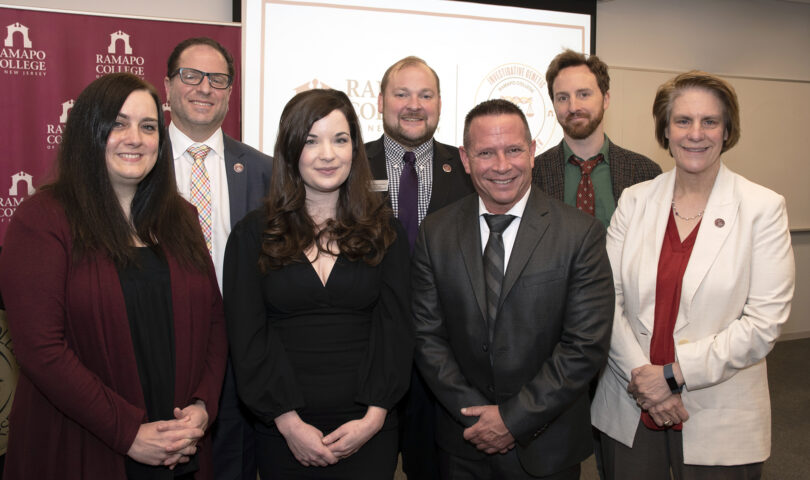The Investigative Genetic Genealogy (IGG) Center is a relatively new addition to Ramapo’s campus. Few would suspect such a monumental step forward, for the field of IGG is tucked away on the first floor of the Learning Commons. The center is the first of its kind “to offer case work, research, and hands-on education in [IGG],” according to a press release.
The developing field of IGG gained prominence in 2018 when it was used to solve the Golden State Killer case. An article in Forensic Science International defines IGG as “the use of SNP-based relative matching combined with family tree research to produce investigative leads in criminal investigations and missing persons cases.”
IGG Center Assistant Director Cairenn Binder described the process as two steps. The first is an outsourced lab process including extraction, genotyping and bioinformatics of a DNA sample.
The center then receives a file that they can upload to the databases GEDmatch and Family Tree DNA for an ethnicity report and a match list. The center uses these tools “to reverse-engineer the family tree of the person that [they’re] trying to identify.”
When Dr. David Gurney, IGG Center director and law & society professor, arrived at Ramapo in 2019, he brought with him the idea for the center. The arrival of President Cindy Jebb offered the perfect opportunity to pitch it.
“Really, just a lot of events came together at the right time,” Gurney said in an interview with The Ramapo News.
Jebb began the Priority Needs Proposal process in 2021, where people from around campus could suggest ideas for new centers, initiatives or projects. The president’s office then selected a few projects to devote resources to.
Gurney suggested involving Binder, who has been at the forefront of the IGG field from the start, to help get the idea off the ground. Gurney described her as “one of the premier investigative genetic genealogists in the world.”
The IGG Center has been working nonstop since its opening in December 2022, with projects including missing persons and wrongful conviction cases.
The center’s first successful identification came in the spring on a missing persons case: Nogales John Doe. They were able to identify him as Donald Hadland, Jr.
In October, they received confirmation on an identification in an 11-year-old cold case. Previously called the St. Louis John Doe, the man is now known to be Joseph Daniel Pierce.
“In most cases, we get about a third cousin match as the top match,” Binder said in an interview. “[Pierce] had a first cousin match in the database, which is why it was so easy.”
The identification was especially important because of Pierce’s African American identity. “If a person is from a population that’s not well-represented in the databases that we use, it’s going to be really, really hard to figure out who they are,” she said. “African Americans are… not [well-represented], so we got lucky that he had a good match.”
That is why one of the center’s current projects is to expand the presence of underrepresented groups in genetic genealogy databases, starting with Latin American populations.
“20% of all unidentified remains in the United States are from Latin American countries,” Binder said.
The center offered free DNA tests to students with at least one Latin American grandparent. Binder implores anyone of Latin American descent who is interested to reach out for a remaining test kit.
According to Binder, the center is waiting for confirmation on seven more identifications, one of which is for a wrongful conviction case.
“That is pretty exciting because it’s only the third time… that IGG has been used in a wrongful conviction,” Gurney said.
The IGG Center offers many opportunities for people to learn more about the field. Their 15-week online certificate program is held twice per year. Most cohorts are adult learners of various backgrounds who join to study IGG and apply their new skills to unsolved cases.
The center also offers an in-person workshop for current Ramapo students of any major and a week-long summer bootcamp for more experienced IGG practitioners.
With the efforts that Gurney and Binder have dedicated to IGG, they are most excited about its impact going forward.
“Unidentified remains cases are the answers to missing person cases, so we are providing answers to families that are looking for their lost loved ones,” Binder said. “This is one area of my life that working as a team has been really special because you’re working together to put these puzzle pieces together and come to an outcome that provides something huge to a waiting family.”
Gurney is also grateful for the opportunity to have a hand in shaping the future of IGG.
“Ramapo, by taking a risk with starting the IGG Center, has really put itself at the forefront of this developing industry,” Gurney said. “We are helping to build this field, which is really cool to be a part of.”
rgatherc@ramapo.edu
Featured photo courtesy of Ramapo College of New Jersey






